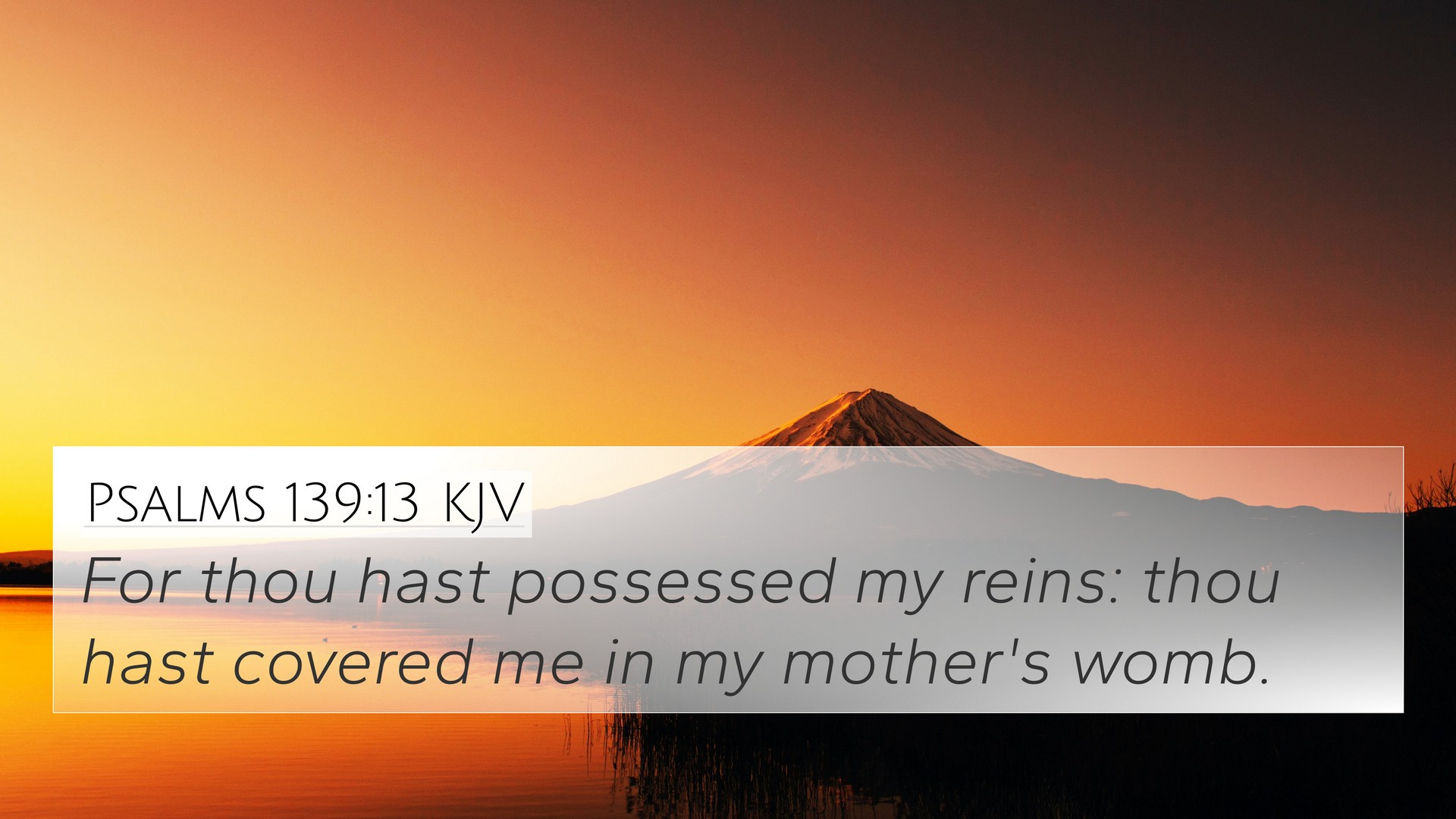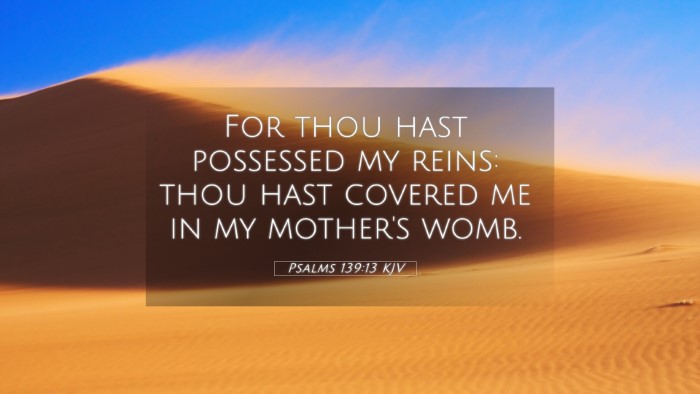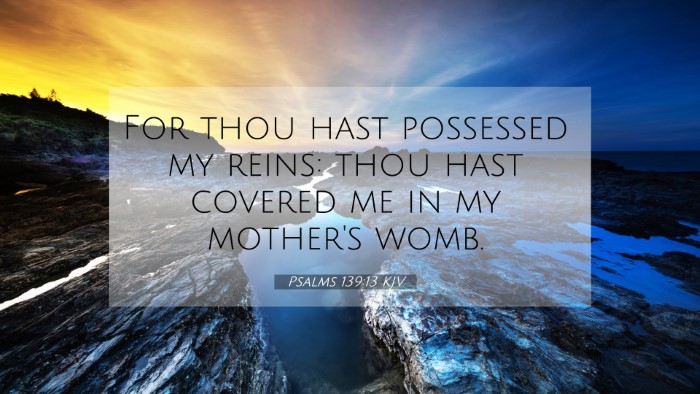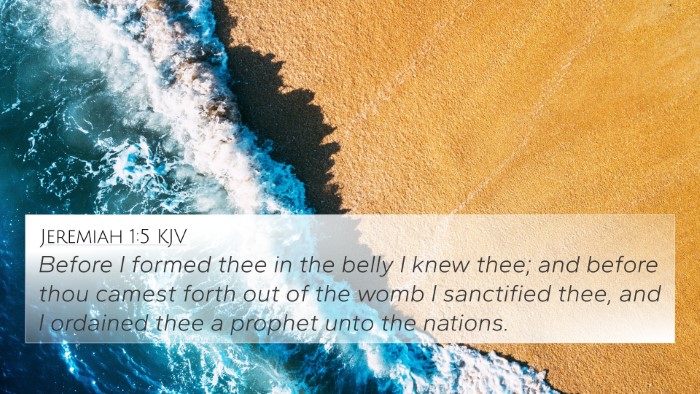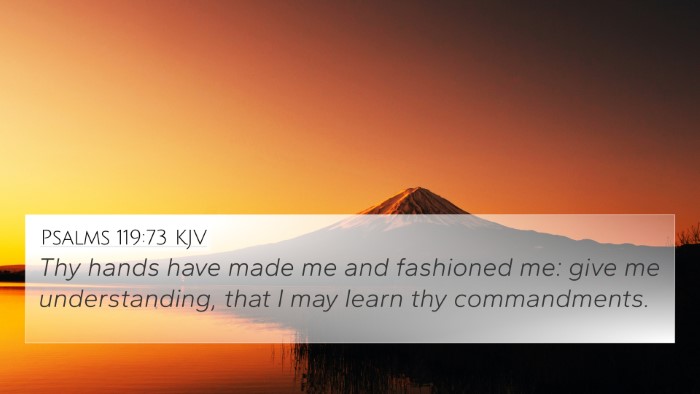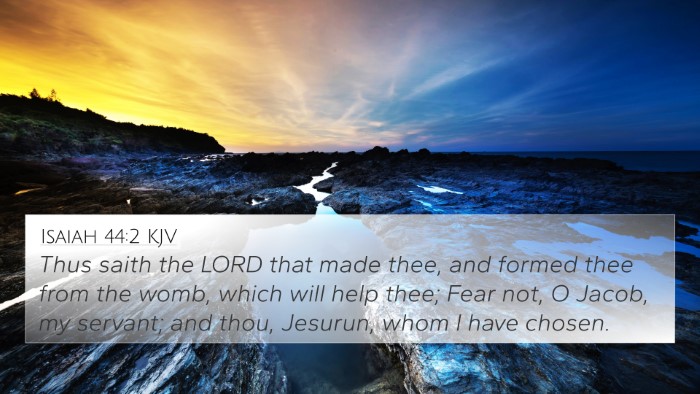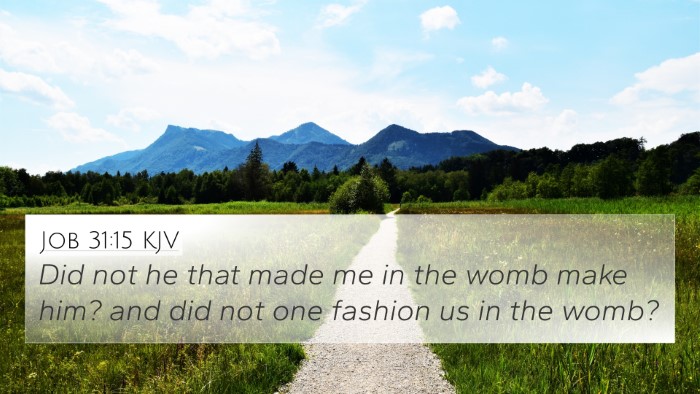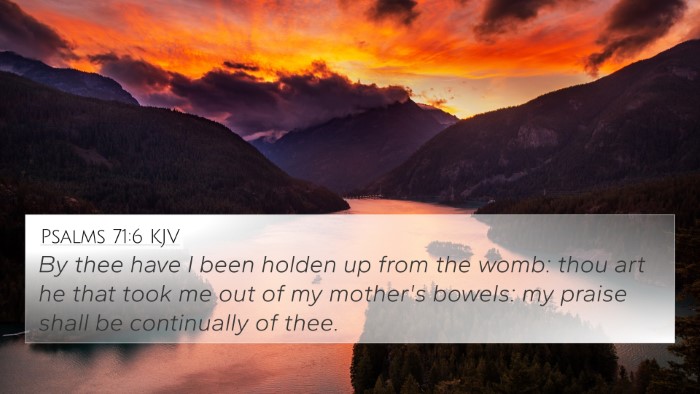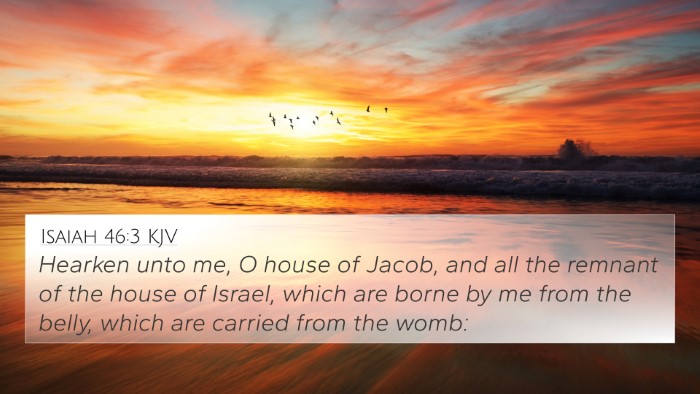Psalms 139:13 - Understanding the Divine Craftsmanship
Psalms 139:13 states, "For you created my inmost being; you knit me together in my mother’s womb." This profound verse reveals the intimate and individual process of human creation, emphasizing God's personal involvement in our lives even before we are born. In understanding this verse, we can glean insights from esteemed public domain commentaries such as those by Matthew Henry, Adam Clarke, and Albert Barnes.
Verse Meaning Overview
The verse highlights several themes that are crucial for a deeper understanding of the scripture:
- Divine Sovereignty: God's sovereignty in creation is an overarching theme, suggesting that every person is intentionally created with purpose.
- Personal Intimacy: The imagery of being "knit together" depicts a careful and loving craftsmanship, indicating that God knows us intricately and personally.
- Value of Life: This verse affirms the inherent value of every life, as each individual is created with care and purpose in the womb.
Commentary Insights
Matthew Henry's Commentary
Matthew Henry notes that this verse speaks to the marvelous nature of God's creation of human life. He emphasizes how God not only creates us but also ensures that every detail of our being is designed with intentionality. Henry suggests that this intimate act of creation calls for a recognition of the sanctity of life from its earliest stages.
Albert Barnes' Commentary
Albert Barnes expands on the notion of being "knit together," suggesting that this metaphor conveys the meticulous attention that God pays to the formation of every individual. He stresses the concept of God’s omniscience and omnipotence in the creative process, framing it as both a privilege and a responsibility for believers to acknowledge and honor life.
Adam Clarke's Commentary
Adam Clarke provides an analytical view of the Hebrew words used in this verse, which communicate the depth of God’s involvement in creation. He highlights that the term ‘inmost being’ relates to the very essence of who we are, further illustrating that God forms us holistically, laying the foundation for our physical, emotional, and spiritual existence.
Cross-Referencing Related Bible Verses
When studying Psalms 139:13, several Bible verses emerge as significant cross-references that reinforce its themes:
- Jeremiah 1:5: "Before I formed you in the womb, I knew you." This verse aligns with the idea of God’s pre-knowledge and purpose in our creation.
- Ephesians 2:10: "For we are God’s handiwork, created in Christ Jesus to do good works." This illustrates that the act of creation is not only intimate but purposeful.
- Isaiah 44:24: "This is what the Lord says—your Redeemer, who formed you in the womb." This further solidifies God's role as the creator of life.
- Job 10:8-9: "Your hands shaped and made me... Remember that you molded me like clay." This analogizes the crafting of life to God's intimate work of pottery, implicating His authority over life.
- Psalm 100:3: "Know that the Lord is God. It is he who made us, and we are his." This acknowledges our identity as created beings belonging to God.
- Genesis 1:26-27: "Let us make mankind in our image." This verse discusses the divine intention behind human creation, echoing the personal connection we have with our Creator.
- Romans 9:20: "But who are you, a human being, to talk back to God? Shall what is formed say to the one who formed it, ‘Why did you make me like this?’" This highlights the relationship between creator and creation.
- Luke 1:44: "As soon as the sound of your greeting reached my ears, the baby in my womb leaped for joy." This illustrates the acknowledgment of life and presence even in the womb.
- Proverbs 16:4: "The Lord has made everything for its purpose." This verse complements the understanding that each life has a specific divine purpose.
- 1 Peter 1:14-16: "As obedient children, do not be conformed to the passions of your former ignorance... but as he who called you is holy, you also be holy." This relates to living with the understanding that we are made by a holy God.
Thematic Bible Verse Connections
The themes found in Psalms 139:13 create a rich tapestry when linked with other scriptures. The following are key thematic connections:
- Creation: Many verses affirm God's role as Creator, speaking to the intricacy and purpose found in life.
- Awareness of God’s Presence: Similar to Psalms 139 itself, other verses speak to the omnipresence of God — for example, in Matthew 28:20, "And surely I am with you always, to the very end of the age."
- Value of Life: Numerous scriptures touch on the sacredness of life, such as Exodus 20:13, "You shall not murder," reinforcing the idea that life is precious.
- Divine Purpose: Verses like Philippians 1:6 echo the notion of God’s ongoing work in believers’ lives, tying back to being created with intention.
Bible Cross-Reference Study Tools
For those interested in further exploring how to find cross-references in the Bible, consider using the following tools:
- Bible Concordance: An essential tool for identifying and locating specific words or themes in the scriptures.
- Cross-Reference Bible Study Guides: These guides provide structured insights into linking Bible verses for deeper understanding.
- Online Bible Reference Resources: Websites that compile cross-references can be helpful for broad thematic studies.
- Chain Reference Systems: Bible editions that include chain references can illuminate connections between verses at a glance.
- Comparative Study Materials: Resources with comparative analyses, particularly of the Gospels, can enhance understanding of biblical narratives.
Conclusion
Psalms 139:13 serves as an exquisite reminder of God's intimate involvement in the creation of each individual. By cross-referencing this verse with others, we anchor our understanding in the broader biblical narrative, fostering a holistic perspective on creation, purpose, and the sanctity of life. The insights garnered from public domain commentaries enhance our comprehension and appreciation of the divine craftsmanship surrounding our existence.
